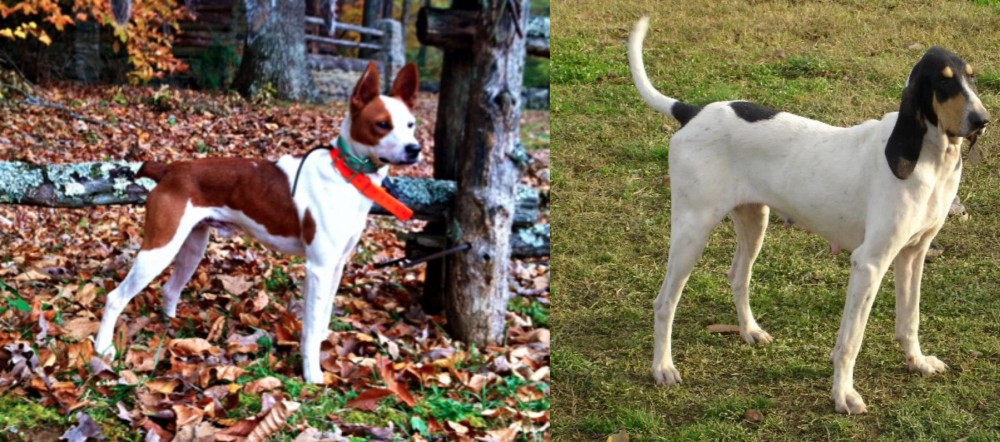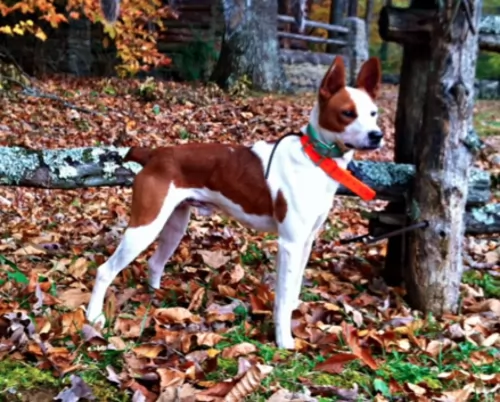 Petzlover
Petzlover Mountain Feist is originated from United States but Petit Gascon Saintongeois is originated from France. Mountain Feist may grow 6 cm / 2 inches shorter than Petit Gascon Saintongeois. Mountain Feist may weigh 27 kg / 60 pounds more than Petit Gascon Saintongeois. Mountain Feist may live 3 years more than Petit Gascon Saintongeois. Both Mountain Feist and Petit Gascon Saintongeois has same litter size. Both Mountain Feist and Petit Gascon Saintongeois requires Low Maintenance.
Mountain Feist is originated from United States but Petit Gascon Saintongeois is originated from France. Mountain Feist may grow 6 cm / 2 inches shorter than Petit Gascon Saintongeois. Mountain Feist may weigh 27 kg / 60 pounds more than Petit Gascon Saintongeois. Mountain Feist may live 3 years more than Petit Gascon Saintongeois. Both Mountain Feist and Petit Gascon Saintongeois has same litter size. Both Mountain Feist and Petit Gascon Saintongeois requires Low Maintenance.
 In the Southern portion of North America, the Mountain Feist was developed. It is the Ozarks and Southern Appalachia that the Mountain Fiest calls his ancestral home. The breed dates back centuries and looks very much like a Jack Russell or rat terrier. George Washington, Abraham Lincoln and William Faulkner all featured the breed in their writings. For Washington it was his diary, Lincoln the poem “The Bear Hunt” and Faulkner “Go Down Moses”. These dogs, much like the Curs, were an important part of the early pioneer days in America.
In the Southern portion of North America, the Mountain Feist was developed. It is the Ozarks and Southern Appalachia that the Mountain Fiest calls his ancestral home. The breed dates back centuries and looks very much like a Jack Russell or rat terrier. George Washington, Abraham Lincoln and William Faulkner all featured the breed in their writings. For Washington it was his diary, Lincoln the poem “The Bear Hunt” and Faulkner “Go Down Moses”. These dogs, much like the Curs, were an important part of the early pioneer days in America.
The name Feist means a noisy, small dog in ancient languages. The Feist was developed in the South, the rural areas, in order to hunt and eliminate vermin and small prey animals. The breed was originally a cross between British terriers and hounds from Native Americans. Many others think the feist is not a breed but a type, a working dog which can vary individual to individual.
The Mountain Feist of today has been bred for hunting performance over generations of time. They hunt racoons, squirrel and rabbits among others. They can track even larger game. Other varieties of the feist include the Bench Legged Feist and the Pencil-tail Feist. This is an energetic working dog, curious, intelligent and alert. It is a loud, barky dog that needs to learn a “no bark” command or it may drive you crazy. The breed make good hunting dogs, watch dogs and companions.
The breed was recognized by the United Kennel Club (UKC) in 2015, but not by the AKC or American Kennel Club. Other breed organizations include the National Cur & Feist Breeder’s Association, The National Feist Breeder’s Association, The American Treeing Feist Association, and the Shadowtails Outdoors Group.
 The Petit Gascon Saintongeois comes from- and is in fact a smaller version of the Grand Gascon Saintongeois. The dog has been used for hunting. Hunters wanted a smaller dog and these were the Petit Gascon Saintongeois.
The Petit Gascon Saintongeois comes from- and is in fact a smaller version of the Grand Gascon Saintongeois. The dog has been used for hunting. Hunters wanted a smaller dog and these were the Petit Gascon Saintongeois.
There was a time when the numbers of these dogs became less and their numbers were restored by Baron Virelade in the 19th century. It is where this dog gets his nickname from.
The Petit Gascon-Saintongeois was recognized by the United Kennel Club on January 1, 1993.
 The Mountain Feist is a medium sized dog with pointy ears that are long and fold over. With their sharp nails that are curved they can climb. Their hind legs are strong to support that activity as well. They have small, dark eyes, a black nose and a muzzle that is medium length and a round skull. The neck is strong, and they have a pretty deep chest. The Mountain Feist tail is bushy, high and erect. There coats come in a variety of colors including blue, black, white, red and brown with the brown being the most common.
The Mountain Feist is a medium sized dog with pointy ears that are long and fold over. With their sharp nails that are curved they can climb. Their hind legs are strong to support that activity as well. They have small, dark eyes, a black nose and a muzzle that is medium length and a round skull. The neck is strong, and they have a pretty deep chest. The Mountain Feist tail is bushy, high and erect. There coats come in a variety of colors including blue, black, white, red and brown with the brown being the most common.
There is a lot of variation of make up and type within the breed itself. Until the last decade or so the breed was fairly isolated among squirrel hunters and there was little cross breeding with other dogs. On the other hand, dogs in the regions where the Mountain Feist was isolated were crossed with them to give them the tree climbing ability, change their size, sharpen their senses or one particular sense and change their appearance.
This is why in different regions you will find Mountain Feist with attributes of the Curs, or the Elkhounds, the Terriers, Spitz or Coonhounds. This accounts for the various types of Mountain Feist Dogs.
 The Petit Gascon Saintongeois is a smaller version of the Grand Gascon Saintongeois but he is still muscled and lean and looked upon as being a large, robust dog.
The Petit Gascon Saintongeois is a smaller version of the Grand Gascon Saintongeois but he is still muscled and lean and looked upon as being a large, robust dog.
His coat is short and dense and is white with black patches and some speckles. You'll find that there are nearly always black patches found on either side of the head, surrounding the eyes and covering the ears. The ears are essentially black, although there is also some tan coloring.
The ears are floppy, the tail long and saber-shaped.The Petit Gascon Saintongeois is a well proportioned dog standing at between 56 to 62cm in height and weighing 23 to 27kg.
The Petit Gascon Saintongeois is a friendly, good-natured pet, being loyal and loving with his human family and being a good playmate to children. He is also intelligent and amicable and will be easily trained and socialized.
 Yes, they very much enjoy playing with children.
Yes, they very much enjoy playing with children.
Tree climbing and stamina.
They need space and land on which to run every day. If you are in an apartment, make sure you have access to a dog park.
They are very intelligent and learn quickly. They love to please but can also be stubborn.
 Your gentle, calm, amicable Petit Gascon-Saintongeois is such an excellent hunting dog, but he doesn’t let that get in the way of him being a wonderful family pet as well.
Your gentle, calm, amicable Petit Gascon-Saintongeois is such an excellent hunting dog, but he doesn’t let that get in the way of him being a wonderful family pet as well.
His friendly, good natured, docile temperament makes this particular breed a superb choice as he gets on so well with children too if they themselves have been taught to be kind to animals and to respect them.
He is intelligent too and easy to train, and he is attractive to look at as a bonus. This all makes him the kind of pet and companion that everyone could benefit from.
 Like most breeds that are isolated, the Mountain Feist does not have a lot of known genetic health issues. They are generally healthy and known to live as many as eighteen years. Perhaps the biggest threat to their lives is the hunting accident, harming joints or paws in hunting situations or being attacked by a larger animal. There are no real genetic threat. Of course, with any dog that has folded ears there is always the possibility of infection or allergies. Keep their ears clean. The other possible concern is hip dysplasia in such an active dog. This can lead to lameness or arthritis. Obesity is another concern that could also lead to hip dysplasia.
Like most breeds that are isolated, the Mountain Feist does not have a lot of known genetic health issues. They are generally healthy and known to live as many as eighteen years. Perhaps the biggest threat to their lives is the hunting accident, harming joints or paws in hunting situations or being attacked by a larger animal. There are no real genetic threat. Of course, with any dog that has folded ears there is always the possibility of infection or allergies. Keep their ears clean. The other possible concern is hip dysplasia in such an active dog. This can lead to lameness or arthritis. Obesity is another concern that could also lead to hip dysplasia.
 The Petit Gascon-Saintongeois has no documented breed related health problems. As previously mentioned, with his long ears, check out the inside of his ears regularly for ear infections.
The Petit Gascon-Saintongeois has no documented breed related health problems. As previously mentioned, with his long ears, check out the inside of his ears regularly for ear infections.
Ticks fleas and worms are a curse. Worms particularly are terrible internal parasites and in fact some worms can even be fatal in puppies. Some of the signs your dogs may have worms include weight loss, a dull, dry, thinning coat, no loger interested in food, diarrhea and vomiting. The best way to respond to your pet’s worm issues is to get him to the vet.
This problem is looked upon as a medical emergency. Gastric dilatation and volvulus, if left, can kill your dog. It’s when gas is trapped in the stomach which has twisted, blocking off the stomach’s blood supply.
Deep chested dogs, feeding your dog just one meal a day so that he gobbles it up too quickly, and older, obese dogs are more prone to bloat. Your dog will require immediate veterinary intervention.
 These are very active pups who need a high protein, high quality dry food. Feed a cup to a cup and half broken down into three meals daily. Do not overfeed your puppy.
These are very active pups who need a high protein, high quality dry food. Feed a cup to a cup and half broken down into three meals daily. Do not overfeed your puppy.
Feed the adult about two cups a day broken into two meals. Again, you are looking for a high quality, high protein dry food. Do not overfeed and watch for obesity.
This is a very active breed – a hunting dog with a lot of stamina, strength and energy. They need plenty of exercise as the terrier side of them is just a little hyper. They need at least two walks per day, and they are not great apartment dogs. They need both mental and physical stimulation. This little dog can keep going at a good rate for a long time.
 The Gascon Saintongeois is looked upon as being a fairly low maintenance breed. That is because the coat is short and smooth, although the coat does become thicker in the Winter time. He sheds so you will want to brush his coat at least twice a week.
The Gascon Saintongeois is looked upon as being a fairly low maintenance breed. That is because the coat is short and smooth, although the coat does become thicker in the Winter time. He sheds so you will want to brush his coat at least twice a week.
With his long floppy ears, during your brushing session, check inside his ears as dampness, wax and debris can become the ideal breeding spot for bacteria, and ear infections can be the result. Check for redness and possible discharge.
Check his eyes that they are clear and bright.
While brushing him, check for any new, unusual lumps.
Keep his nails well trimmed.
Provide him with a nice warm, dry spot to sleep.
When he’s oudoors, make sure that he has both sun and shade and that his waterbowl is always available.
Make sure that at the first signs of illness you get your pet to the vet.
Feed him only the best quality kibble there is. Occasionally give him some home-made food. Keep this food simple and nutritious. You can’t go wrong with boiled chicken, brown rice or pasta, sweet potatoes, carrots and spinach. You can chop this up and add it to his kibble. Sometimes it can benefit your pet to include some raw meat as well.
If only pet owners would realize that their pets don’t want all those spicy, exotic people foods. They just give a dog a stomach ache and eventually shorten his life. Make sure he always has access to a bowl of cool, fresh water.